EIM 导学案 Book 1 Unit 10 Don't Give up
- 格式:pdf
- 大小:108.70 KB
- 文档页数:3
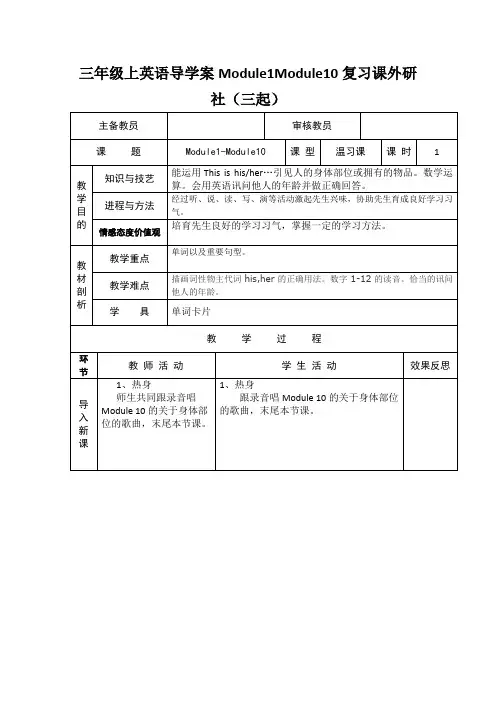
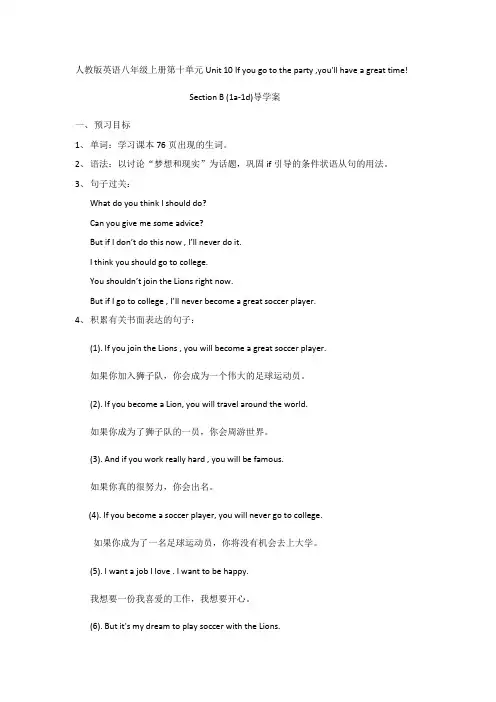
人教版英语八年级上册第十单元Unit 10 If you go to the party ,you'll have a great time!Section B (1a-1d)导学案一、预习目标1、单词:学习课本76页出现的生词。
2、语法:以讨论“梦想和现实”为话题,巩固if引导的条件状语从句的用法。
3、句子过关:What do you think I should do?Can you give me some advice?But if I don’t do this now , I’ll never do it.I think you should go to college.You shouldn’t join the Lions right now.But if I go to college , I’ll never become a great soccer player.4、积累有关书面表达的句子:(1). If you join the Lions , you will become a great soccer player.如果你加入狮子队,你会成为一个伟大的足球运动员。
(2). If you become a Lion, you will travel around the world.如果你成为了狮子队的一员,你会周游世界。
(3). And if you work really hard , you will be famous.如果你真的很努力,你会出名。
(4). If you become a soccer player, you will never go to college.如果你成为了一名足球运动员,你将没有机会去上大学。
(5). I want a job I love . I want to be happy.我想要一份我喜爱的工作,我想要开心。
(6). But it's my dream to play soccer with the Lions.但是和狮子队的队员们一起踢球是我的梦想。

【英语教案】六年级英语上册Lesson 10导学案【英语教案】六年级英语上册lesson10导学案吉教班小学英语六年级第一册lesson10limingmeetsjenny’sclass导学――评价单名称:等级:设计师:田晓红【学习目标】learningobjectives1.我会听、读、写关于公寓的事,公里2.我能运用句型:iamfrom____.isthatfarfrom____?[重点和难点]关键概念1.重点是单词apartment,kilometre.2.困难在于使用单词和句型:iamfrom__________________?【知识链接】knowledgelinks(学生复习学过的知识,2分钟)复习小组中的问候语【预习积累】read,circleandwrite.(自主学习,圈出新词汇,完成练习)1.(自己朗读课文,然后翻译下列短语或句子,看看谁跑得最快。
请举手2分钟) apartment__________kilometre__________athome______________你会说英语_________________________2.(再读课一遍,然后完成下列练习,看谁最快请举手,2分钟)① 当有人称赞你说:“你会说英语。
”你可以回答:a.thankyou.b.no,i'mnotverygood.c.yes,ido.② 一个朋友问你:“你多大了?”你如何回应?a.great!b.fine,thanks!c.i'meleven.③ 如果你想知道你朋友的家离学校远不远,你应该怎么问?a.howfarisyourhome?b.isyourhomeandschoolfar?c、你的家离学校远吗?【合作探究】readandwrite.(交流群组。
听录音,读课,在小组内充分交流,探究完成并展示。
10分钟)将单词重新排列成句子。
连词构成句子。
1.lives/my/in/family/apartment/an__________________________________________________2.city/xi'an/is/your__________________________________________________3.family/english/everyone/in/does/your/speak__________________________________________________【拓展延伸】用本中的句子,以小组为单位编对话。
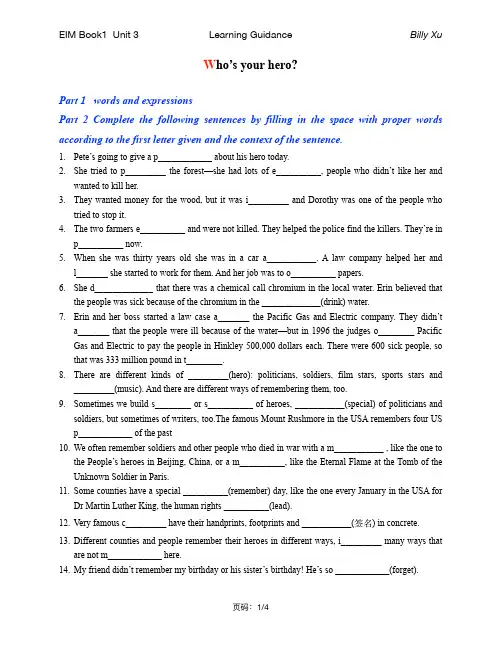
W ho’s your hero?Part 1 words and expressionsPart 2 Complete the following sentences by filling in the space with proper words according to the first letter given and the context of the sentence.1.Pete’s going to give a p____________ about his hero today.2.She tried to p_________ the forest—she had lots of e__________, people who didn’t like her andwanted to kill her.3.They wanted money for the wood, but it was i_________ and Dorothy was one of the people whotried to stop it.4.The two farmers e__________ and were not killed. They helped the police find the killers. They’re inp__________ now.5.When she was thirty years old she was in a car a___________. A law company helped her andl_______ she started to work for them. And her job was to o__________ papers.6.She d_____________ that there was a chemical call chromium in the local water. Erin believed thatthe people was sick because of the chromium in the _____________(drink) water.7.Erin and her boss started a law case a_______ the Pacific Gas and Electric company. They didn’ta_______ that the people were ill because of the water—but in 1996 the judges o________ Pacific Gas and Electric to pay the people in Hinkley 500,000 dollars each. There were 600 sick people, so that was 333 million pound in t________.8.There are different kinds of _________(hero): politicians, soldiers, film stars, sports stars and_________(music). And there are different ways of remembering them, too.9.Sometimes we build s________ or s__________ of heroes, ___________(special) of politicians andsoldiers, but sometimes of writers, too.The famous Mount Rushmore in the USA remembers four US p____________ of the past10.We often remember soldiers and other people who died in war with a m___________ , like the one tothe People’s heroes in Beijing, China, or a m__________, like the Eternal Flame at the Tomb of the Unknown Soldier in Paris.11.Some counties have a special __________(remember) day, like the one every January in the USA forDr Martin Luther King, the human rights __________(lead).12.Very famous c_________ have their handprints, footprints and ___________(签名) in concrete.13.Different counties and people remember their heroes in different ways, i_________ many ways thatare not m____________ here.14.My friend didn’t remember my birthday or his sister’s birthday! He’s so ____________(forget).15.We went to Hainan for our winter holiday last month. We really had a lot of fun on the beach— it wasan _____________(forget) holiday.16.She was the first woman to walk to the m_________ North Pole alone. She was__________(complete) alone e__________ for her dog, Charlie.Part 2 word transformationual adj. —>___________(adj. opposite)—>_____________(adv.)2.scare v. —>___________(adj) —> _____________(adj)3.produce v. —>___________(n) —> _____________(n)—>______________(adj.)4.regular adj.—>____________(adv.)—> _____________(adj. opposite)5.create v. —> _____________(n) —>_____________(adj)—->_____________(n)6. art n. —>_______________(n)—>________________(adj)7. magic adj. —>_____________(n)—>______________(n)Part 3 Listening practice: Dictation1.One day she realised that there were lots of papers about some very sick people in a place callHinkley.2.Then she moved to southern California and married a restaurant manager. When she was 30 years old,she was in a car accident.3.She visited lots of sick people in Hinkley and listened to their stories. All the people lived near a bigPacific Gas and Electric factory and she discovered that there was a chemical called Chromium in the local water, which was from the factory.4.Erin believed that the people were sick because of the chromium in their drinking water. So she andher boss started a law case against the company. The company wasn’t happy about this.5.They didn’t agree that the people were ill because of the water—but in 1996 the judges orderedPacific Gas and Electric to pay the people in Hinkley 500,000 dollars each. There were 600 sick people, so that was 333 million pound in total.6.She has her own company and she gives talks all over the world.7.There are different kinds of heroes: politicians, soldiers, film stars, sports stars and musicians. Andthere are different ways of remembering them, too.8.Sometimes we build statues or sculptures of heroes, especially of politicians and soldiers, butsometimes of writers, too.9.The famous Mount Rushmore in the USA remembers four US presidents of the past.10.We often remember soldiers and other people who died in war with a monument, like the Monumentto the People’s heroes in Beijing, China.11.Some counties have a special remembrance day, like the one every January in the USA for Dr MartinLuther King, the human rights leader.12.Many people left flowers and messages near the place where the car accident happened.13.Sometimes places are named after famous people: for example, Liverpool, in England.14.Very famous celebrities have their handprints, footprints and autographs in concrete.15.Different counties and people remember their heroes in different ways, including many ways that arenot mentioned here.16.She was the first woman to walk to the magnetic North Pole alone.17.On her journey, Helen didn’t have any help. She was completely alone except for a dog, Charlie, aCanadian Husky.18.She walked 345 miles in temperature of -50 degrees. Once, seven polar bears attacked Helen andCharlie. Charlie saved Helen’ s life.19.She was determined to make it come true. She was always positive, even in very dangerous anddifficult situations.20.She tried to protect the forest -she had lots of enemies, people who didn't like her and wanted to killher.21.A lot of people wanted to cut down the tree, they wanted money for the wood, but it was illegal andDorothy was one of the people who tried to stop it.22.It was the 12th of February in fact, 2005, she was on her way to a meeting, there were two farmerswith her, and two men walked up to her and they pulled out a gun and they killed her.”23.She worked all her life to help people and to protect the forest, and she died for that. I think she wasgreat.Part 4TAPESCRIPTCD1 T23Teacher: oK, so Pete is going to give us his presentation today. So, Pete, can you come up here please, to the front of the class? Who is your presentation about, Pete?Pete: Erm, it's about someone called Dorothy Stang, She was an American woman who lived in Brazil. Teacher: oK, Pete, tell us all about her and why she's your hero.Pete: Right, oK. Well, Dorothy Stang was born in 1931. She was born in a place called Dayton in Ohio in the USA. One day she decided to change her life. She wanted to help poor people somewhere. So in 1966 she went to live and work in Brazil, in a state called Pará…Teacher: Where in Brazil is that, Pete?Pete: It's in the north. Part of the Amazon forest is there, erm, it's right up in the north of Brazil. Teacher: Good, thanks. Go on.Pete: Right, so, she lived in a town called Anapú and in the 1970s she started to work with small farmers there. She tried to protect the forest -she had lots of enemies, people who didn't like her and wanted to kill her.Girl: Why?Pete: Well, a lot of people wanted to cut down the tree, they wanted money for the wood, but it was illegal and Dorothy was one of the people who tried to stop it.Girl:Oh, right.Pete: Anyway, Dorothy was sure people wanted to kill her. But she always said: I don’t want to run away, I want to stay here and save the people and the trees.' So she stayed, she didn't leave Anapú. And in 2004, she was 'Woman of the Year' in Pará state.But one day in 2005, erm it was the 12th of February in fact, 2005, she was on her way to a meeting, there were two farmers with her, and two men walked up to her and they pulled out a gun and they killed her.”Boy: What about the two farmers? Did they kill them too?Pete:No, they escaped, and they helped the police to fInd the two kIllers. They're in prison now. So, Dorothy Stang is my hero. She worked all her life to help people and to protect the forest, and she died for that. I think she was great.Girl: Where can we find out more about her?Pete: Erm, well, they made a film about her in 2008. lt's called They Killed Sister Dorothy. Or you can look on the Internet. There are quite a few…。
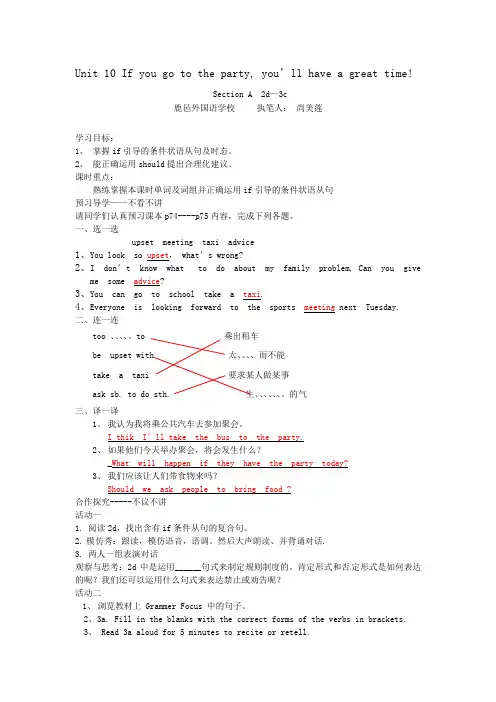
Unit 10 If you go to the party, you’ll have a great time!Section A 2d—3c鹿邑外国语学校执笔人:尚美莲学习目标:1、掌握if引导的条件状语从句及时态。
2、能正确运用should提出合理化建议。
课时重点:熟练掌握本课时单词及词组并正确运用if引导的条件状语从句预习导学——不看不讲请同学们认真预习课本p74----p75内容,完成下列各题。
一、选一选upset meeting taxi advice1、You look so upset, what’s wrong?2、I don’t know what to do about my family problem, Can you giveme some advice?3、You can go to school take a taxi.4、Everyone is looking forward to the sports meeting next Tuesday.二、连一连too 、、、、、to 乘出租车be upset with 太、、、、而不能take a taxi 要求某人做某事ask sb. to do sth. 生、、、、、、、的气三、译一译1、我认为我将乘公共汽车去参加聚会。
I thik I’ll take the bus to the party.2、如果他们今天举办聚会,将会发生什么?_What will happen if they have the party today?3、我们应该让人们带食物来吗?Should we ask people to bring food ?合作探究-----不议不讲活动一1. 阅读2d,找出含有if条件从句的复合句。
2.模仿秀:跟读,模仿语音,语调。
然后大声朗读、并背诵对话.3. 两人一组表演对话观察与思考:2d中是运用______句式来制定规则制度的。

eim剑桥英语教材Don't give up课文电子版1、_____ the plan carefully,he rejected it. [单选题] *A. To have consideredB.To considerC. Having considered(正确答案)D. Considering2、His new appointment takes()from the beginning of next month. [单选题] *A. placeB. effect(正确答案)C. postD. office3、I can’t hear you _______. Please speak a little louder. [单选题] *A. clearly(正确答案)B. lovelyC. widelyD. carelessly4、I didn't hear _____ because there was too much noise where I was sitting. [单选题] *A. what did he sayB. what he had said(正确答案)C. what he was sayingD. what to say5、These plastics flowers look so_____that many people think they are real. [单选题] *A.beautifulB.artificialC.natural(正确答案)D.similar6、There are sixty _______ in an hour. [单选题] *A. hoursB. daysC. minutes(正确答案)D. seconds7、Seldom _____ in such a rude way. [单选题] *A.we have been treatedB. we have treatedC. have we been treated(正确答案)D. have treated8、I passed the test, I _____ it without your help. [单选题] *A.would not passB. wouldn't have passed(正确答案)C. didn't passD.had not passed9、—Could you take out the rubbish, Jim?—______. I have too much homework to do. You can ask Sally to do it. ()[单选题] *A. Sorry, I can’t(正确答案)B. No problemC. I disagreeD. No, thanks10、—______ is the concert ticket?—It’s only 160 yuan.()[单选题] *A. How manyB How much(正确答案)C. How oftenD. How long11、Li Lei often takes a walk early ______ the morning.()[单选题] *A. atB. onC. in(正确答案)D. for12、I often _______ music from the Internet. [单选题] *A. download(正确答案)B. spendC. saveD. read13、There was a time()I wondered why I would like to do this boring job. [单选题] *A. whichB. whyC. whereD. when(正确答案)14、Mr. Brown ______ the football match next week.()[单选题] *A. is seeingB. seesC. sawD. is going to see(正确答案)15、A modern city has sprung up in _____was a waste land ten years ago. [单选题] *A.whichB.what(正确答案)C.thatD.where16、Mary wanted to travel around the world all by herself, but her parents did not _______ her to do so. [单选题] *A. forbidB. allowC. follow(正确答案)D. ask17、We have ______ homework today. ()[单选题] *A. too manyB. too much(正确答案)C. much tooD. very much18、The organization came into being in 1 [单选题] *A. 开始策划B. 进行改组C. 解散D. 成立于(正确答案)19、We often go to the zoo _______ Saturday mornings. [单选题] *A. atB. inC. on(正确答案)D. of20、I _______ play the game well. [单选题] *A. mustB. can(正确答案)C. wouldD. will21、The twins _______ us something about their country. [单选题] *A. told(正确答案)B. saidC. talkedD. spoke22、Bill Gates is often thought to be the richest man in the world. _____, his personal life seems not luxury. [单选题] *A. MoreoverB. ThereforeC. However(正确答案)D. Besides23、The little girl held _____ in her hand. [单选题] *A. five breadsB. five piece of breadsC. five piece of breadD. five pieces of bread(正确答案)24、There may be something wrong with her _______. She can’t see things clearly. [单选题] *A. eyes(正确答案)B. earsC. mouthD. nose25、_______ songs is my favorite. [单选题] *A. To Singing EnglishB. Singing English(正确答案)C. Singings EnglishD. Sing English26、Many people believe that _________one has, _______ one is, but actually it is not true. [单选题] *A. the more money ; the happier(正确答案)B. the more money ; the more happyC. the less money ; the happierD. the less money ; the more happy27、He always did well at school _____ having to do part-time jobs every now and then. [单选题] *A despite ofB. in spite of(正确答案)C. regardless ofD in case of28、In many cities, a low-carbon lifestyle has become(). [单选题] *A. more popular and more popularB. more and more popular(正确答案)C. the most popularD. most and most popular29、I _______ Zhang Hua in the bookstore last Sunday. [单选题] *A. meetB. meetingC. meetedD. met(正确答案)30、12.Who will ________ the Palace Museum after Shan Jixiang retires? [单选题] * A.in chargeB.in charge ofC.be in charge of (正确答案)D.be in the charge of。
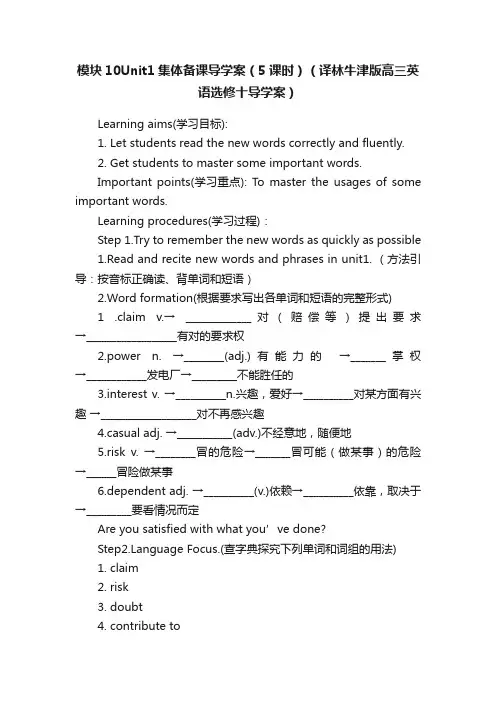
模块10Unit1集体备课导学案(5课时)(译林牛津版高三英语选修十导学案)Learning aims(学习目标):1. Let students read the new words correctly and fluently.2. Get students to master some important words.Important points(学习重点): To master the usages of some important words.Learning procedures(学习过程):Step 1.Try to remember the new words as quickly as possible1.Read and recite new words and phrases in unit1. (方法引导:按音标正确读、背单词和短语)2.Word formation(根据要求写出各单词和短语的完整形式)1 .claim v.→ _____________对(赔偿等)提出要求→__________________有对的要求权2.power n. →________(adj.)有能力的→_______掌权→____________发电厂→_________不能胜任的3.interest v. →__________n.兴趣,爱好→__________对某方面有兴趣→___________________对不再感兴趣4.casual adj. →___________(adv.)不经意地,随便地5.risk v. →________冒的危险→_______冒可能(做某事)的危险→______冒险做某事6.dependent adj. →__________(v.)依赖→__________依靠,取决于→_________要看情况而定Are you satisfied with what you’ve done?nguage Focus.(查字典探究下列单词和词组的用法)1. claim2. risk3. doubt4. contribute to5. show off6. power/ energy/ force /strength7. be dependent on8. switch from你认为本单元还有那些重要的单词和词组,请写下来并给出解析。
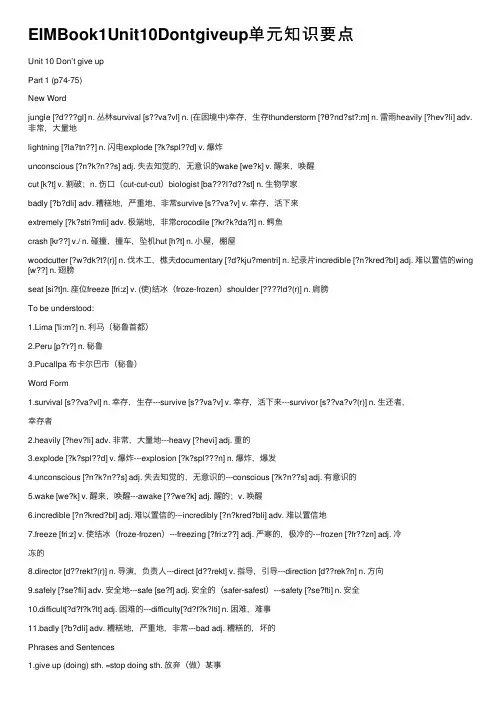
EIMBook1Unit10Dontgiveup单元知识要点Unit 10 Don’t give upPart 1 (p74-75)New Wordjungle [?dgl] n. 丛林survival [s??va?vl] n. (在困境中)幸存,⽣存thunderstorm [?θ?nd?st?:m] n. 雷⾬heavily [?hev?li] adv.⾮常,⼤量地lightning [?la?tn??] n. 闪电explode [?k?spl??d] v. 爆炸unconscious [?n?k?n??s] adj. 失去知觉的,⽆意识的wake [we?k] v. 醒来,唤醒cut [k?t] v. 割破;n. 伤⼝(cut-cut-cut)biologist [bal?d??st] n. ⽣物学家badly [?b?dli] adv. 糟糕地,严重地,⾮常survive [s??va?v] v. 幸存,活下来extremely [?k?stri?mli] adv. 极端地,⾮常crocodile [?kr?k?da?l] n. 鳄鱼crash [kr??] v./ n. 碰撞,撞车,坠机hut [h?t] n. ⼩屋,棚屋woodcutter [?w?dk?t?(r)] n. 伐⽊⼯,樵夫documentary [?d?kju?mentri] n. 纪录⽚incredible [?n?kred?bl] adj. 难以置信的wing [w??] n. 翅膀seat [si?t]n. 座位freeze [fri:z] v. (使)结冰(froze-frozen)shoulder [ld?(r)] n. 肩膀To be understood:1.Lima ['li:m?] n. 利马(秘鲁⾸都)2.Peru [p?'r?] n. 秘鲁3.Pucallpa 布卡尔巴市(秘鲁)Word Form1.survival [s??va?vl] n. 幸存,⽣存---survive [s??va?v] v. 幸存,活下来---survivor [s??va?v?(r)] n. ⽣还者,幸存者2.heavily [?hev?li] adv. ⾮常,⼤量地---heavy [?hevi] adj. 重的3.explode [?k?spl??d] v. 爆炸---explosion [?k?spln] n. 爆炸,爆发4.unconscious [?n?k?n??s] adj. 失去知觉的,⽆意识的---conscious [?k?n??s] adj. 有意识的5.wake [we?k] v. 醒来,唤醒---awake [??we?k] adj. 醒的;v. 唤醒6.incredible [?n?kred?bl] adj. 难以置信的---incredibly [?n?kred?bli] adv. 难以置信地7.freeze [fri:z] v. 使结冰(froze-frozen)---freezing [?fri:z??] adj. 严寒的,极冷的---frozen [?fr??zn] adj. 冷冻的8.director [d??rekt?(r)] n. 导演,负责⼈---direct [d??rekt] v. 指导,引导---direction [d??rek?n] n. ⽅向9.safely [?se?fli] adv. 安全地---safe [se?f] adj. 安全的(safer-safest)---safety [?se?fti] n. 安全10.difficult[?d?f?k?lt] adj. 困难的---difficulty[?d?f?k?lti] n. 困难,难事11.badly [?b?dli] adv. 糟糕地,严重地,⾮常---bad adj. 糟糕的,坏的Phrases and Sentences1.give up (doing) sth. =stop doing sth. 放弃(做)某事4.Unit 10 Part 2 (p76-77)New Wordthunder [?θ?nd?(r)] n. 雷声,隆隆的响声clear [kl??(r)] adj. 清楚的;v. 清除,搬⾛shower [??a??(r)] n. 阵⾬,淋浴forecast [? f?:kɑ:st] v.&n. 预测,预报shine [?a?n] v. 照射,闪耀(shone-shone)expect [?k?spekt] v. 期望,预料thunderstorm [?θ?nd?st??m] n. 雷⾬,雷暴foggy [?f?gi] adj. 有雾的(foggier-foggiest)cloudy [?kla?di] adj. 阴天的,多云的once [w?ns] adv. 曾经,⼀次;conj. ⼀...就... lazily['le?z?l?] adv. 懒惰地,懒散地impatiently [?m'pe??ntl?] adv. 不耐烦地,焦急地operate [??p?re?t] v. 运转,经营,⼿术presentation [?prezn?te??n] n. 提交,陈述,报告To be understand:bricklayer [?br?kle??(r)] n. 砖匠Olympic Gold Medal [?medl] n. 奥运⾦牌silver medal 银牌bronze medal 铜牌Super Giant Slalom (super-G) 超级障碍滑雪Birmingham n. 伯明翰市(英国中部城市)Austria ['?str??] n. 奥地利Austrian [?? stri?n] n. 奥地利⼈Word Form1.slow adj. ---slowly adv. 缓慢地2.loud adj. ---loudly adv. ⼤声地3.fog [f?g] n. 雾---foggy [?f?gi] adj. 有雾的(foggier-foggiest)4.cloud n. ---cloudy [?kla?di] adj. 阴天的,多云的5.quiet adj. ---quietly adv. 安静地6.hard adj. ---hard adv. 勤奋地,猛烈地---hardly ⼏乎不/doc/6e83d8f77a3e0912a21614791711cc7930b7786c.html zy adj. ---lazily['le?z?l?] adv. 懒惰地,懒散地8.impatient [?m?pe??nt] adj. 不耐烦的---impatiently [?m'pe??ntl?] adv. 不耐烦地,焦急地---patient [?pe??nt]adj. 有耐⼼的;n. 病⼈---patience [?pe??ns] n. 忍耐,耐⼼9.ski v. 滑雪---skier n. 滑雪者---skiing n. 滑雪10.expect [?k?spekt] v. 期望,预料---expectation [?ekspek?te??n] n. 预期,期待expected [?k?spekt?d] adj. 预期的,预料的---unexpected [??n?k?spekt?d] adj. 出乎意料的11.proper adj. 合适的,恰当的---properly adv. 正确地,恰当地12.operate [??p?re?t] v. 开⼑,动⼿术,操作---operation [??p??re??n] n. ⼿术,操作---operator [??p?re?t?(r)]n. 操作员,经营者13.presentation [?prezn?te??n] n. 陈述,报告---present [?preznt] v. 提出;adj. ⽬前的,现在的---presenter[pr??zent?(r)] n. 主持⼈,提出者,陈述⼈Phrases and Sentences1.the weather forecast 天⽓预报2.at least ⾄少Try to eat at least four slices of bread a day.3.at most ⾄多There are at most twenty people in the classroom./doc/6e83d8f77a3e0912a21614791711cc7930b7786c.html ter on 以后,⽇后I have to interrupt you as I have another meeting later on.5.with an expected high of 14 ℃预期温度为14摄⽒度6.keep doing sth. 坚持做某事Keep practicing 坚持练习7.at 100 kilometers per hour 每⼩时100千⽶100 kph8.no more 不再no more skiing 别再滑雪了He said no more. Obviously he was a man of few words.9.expect to do sth.=look forward to doing sth. 期待做某事10.prefer to do/ doing sth. 更喜欢做某事; prefer doing A to doing B ⽐起做B更喜欢做A; prefer to do sth.rather than do sth.= would rather do sth. than do sth.= instead of doing sth. 宁愿做某事11.be patient with sth./sb. 有耐⼼地对待某事或某⼈12.give a presentation about… 做⼀个关于…的陈述13.operate on sb. 给某⼈做⼿术14.天⽓描述:bright sunshine明媚的阳光; a gentle breeze微风习习; dark cloud乌云; thin fog⼤雾; heavy rain暴⾬; a thin mist 薄雾; a light shower阵⾬; heavy snow⼤雪; a strong wind强风; a violent storm 风暴.Unit 10 Part 3/4 P78-81New Wordpain [pe?n] n. (⾁体上)疼痛press [pres] v. 按,压weird [w??d] adj. 古怪的,奇异的wimp [w?mp] n. 懦弱的⼈,⽆⽤的⼈stomach [?st?m?k] n. 胃,腹部bet [bet] v. 打赌(bet-bet) neck [nek] n. 脖⼦headache [?hede?k] n. 头痛aspirin [??spr?n] n. 阿司匹林castle [?kɑ:sl] n. 城堡Word Form1.pain [pe?n] n. 疼痛,痛苦;v. 使疼痛---painful [?pe?nfl] adj. 痛苦的---painless [?pe?nl?s] adj. ⽆痛的2.stomach [?st?m?k] n. 胃,腹部---stomachache ['st?m?ke?k] n. 胃痛,腹痛3.press [pres] v. 按,压---pressure [?pre??(r)] n. 压⼒14.15.16.17.18.19.。
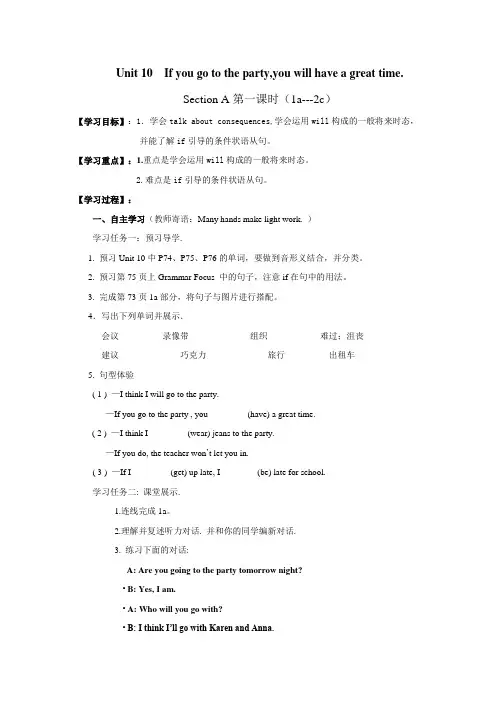
Unit 10 If you go to the party,you will have a great time.Section A第一课时(1a---2c)【学习目标】:1.学会talk about consequences,学会运用will构成的一般将来时态,并能了解if引导的条件状语从句。
【学习重点】:1.重点是学会运用will构成的一般将来时态。
2.难点是if引导的条件状语从句。
【学习过程】:一、自主学习(教师寄语:Many hands make light work. )学习任务一:预习导学.1. 预习Unit 10中P74、P75、P76的单词,要做到音形义结合,并分类。
2. 预习第75页上Grammar Focus 中的句子,注意if在句中的用法。
3. 完成第73页1a部分,将句子与图片进行搭配。
4.写出下列单词并展示.会议________ 录像带________ 组织________ 难过;沮丧________建议________ 巧克力________ 旅行________ 出租车________5. 句型体验( 1 ) —I think I will go to the party.—If you go to the party , you ________ (have) a great time.( 2 ) —I think I ________ (wear) jeans to the party.—If you do, the teacher won’t let you in.( 3 ) —If I ________ (get) up late, I ________(be) late for school.学习任务二: 课堂展示.1.连线完成1a。
2.理解并复述听力对话. 并和你的同学编新对话.3. 练习下面的对话:A: Are you going to the party tomorrow night?•B: Yes, I am.•A: Who will you go with?•B: I think I’ll go with Karen and Anna.•A: If you do, you’ll have a great time.4. 听录音.完成2a and 2b.5.两人一组,利用上面的内容来练习对话.并编出新对话。
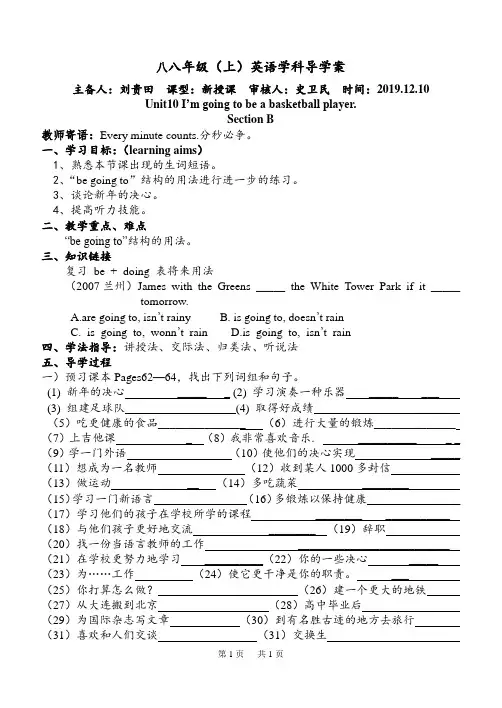
八八年级(上)英语学科导学案主备人:刘贵田课型:新授课审核人:史卫民时间:2019.12.10Unit10 I’m going to be a basketball player.Section B教师寄语:Every minute counts.分秒必争。
一、学习目标:(learning aims)1、熟悉本节课出现的生词短语。
2、“be going to”结构的用法进行进一步的练习。
3、谈论新年的决心。
4、提高听力技能。
二、教学重点、难点“be going to”结构的用法。
三、知识链接复习be + doing 表将来用法(2007兰州)James with the Greens _____ the White Tower Park if it _____ tomorrow.A.are going to, isn’t rainyB. is going to, doesn’t rainC. is going to, wonn’t rainD.is going to, isn’t rain四、学法指导:讲授法、交际法、归类法、听说法五、导学过程一)预习课本Pages62—64,找出下列词组和句子。
(1) 新年的决心_____ _ (2) 学习演奏一种乐器_____ ___ (3)组建足球队(4)取得好成绩______ (5)吃更健康的食品_______________ (6)进行大量的锻炼______________ (7)上吉他课_ (8)我非常喜欢音乐.__________ _ _ (9)学一门外语(10)使他们的决心实现_____ (11)想成为一名教师(12)收到某人1000多封信(13)做运动__ (14)多吃蔬菜________(15)学习一门新语言(16)多锻炼以保持健康____ (17)学习他们的孩子在学校所学的课程________ ___________ (18)与他们孩子更好地交流________ (19)辞职(20)找一份当语言教师的工作__________________________ (21)在学校更努力地学习__________(22)你的一些决心_____ (23)为……工作(24)使它更干净是你的职责。
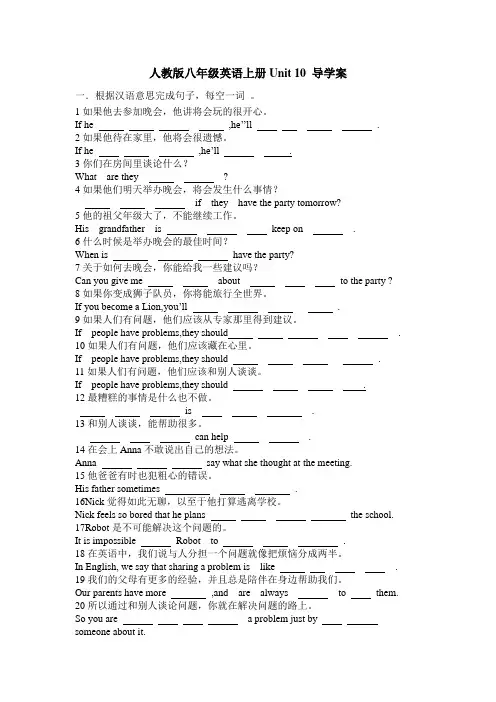
人教版八年级英语上册Unit 10 导学案一.根据汉语意思完成句子,每空一词。
1如果他去参加晚会,他讲将会玩的很开心。
If he ,he’’ll .2如果他待在家里,他将会很遗憾。
If he ,he’ll .3你们在房间里谈论什么?What are they ?4如果他们明天举办晚会,将会发生什么事情?if they have the party tomorrow?5他的祖父年级大了,不能继续工作。
His grandfather is keep on .6什么时候是举办晚会的最佳时间?When is have the party?7关于如何去晚会,你能给我一些建议吗?Can you give me about to the party ? 8如果你变成狮子队员,你将能旅行全世界。
If you become a Lion,you’ll .9如果人们有问题,他们应该从专家那里得到建议。
If people have problems,they should . 10如果人们有问题,他们应该藏在心里。
If people have problems,they should .11如果人们有问题,他们应该和别人谈谈。
If people have problems,they should .12最糟糕的事情是什么也不做。
is .13和别人谈谈,能帮助很多。
can help .14在会上Anna不敢说出自己的想法。
Anna say what she thought at the meeting.15他爸爸有时也犯粗心的错误。
His father sometimes .16Nick觉得如此无聊,以至于他打算逃离学校。
Nick feels so bored that he plans the school. 17Robot是不可能解决这个问题的。
It is impossible Robot to .18在英语中,我们说与人分担一个问题就像把烦恼分成两半。
高三英语导学案Module10 Unit 1 Reading(1)(使用说明) 本课时的导学案主要是检查,巩固同学们对本单元Reading的阅读理解情况。
一.课前导学Task 1:Read the passage quickly and answer the questions in Part A(P2)1.____________________________________________________________________2.____________________________________________________________________3.____________________________________________________________________Task 2 : Tell true or false according to the passage1.Live Aid concert raised $100 million for famine victims in developing countries and alsoraised public attention.2.The World Food Programme was set up in 1963 so as to reduce the problem of world hunger.3.Food aid alone is enough to help poor countries.4.The infrastructure of a country includes things like transport, irrigation, electricity, postal service, telephones and schools.5.Development aid together with food aid is the short-term solution to the problem of poverty.cation and training for young people in developing countries is very important because the future of developing countries lies in the hands of young people.7. It is better to give a man a fish than to teach him to fish.Task 3 : Analyse the structure of the passage and give the general idea of each part:Part1(par1---par3): 1 ____________________________________________ Part2(par4---par6): 2 ____________________________________________ Part3(par7): 3 ____________________________________________________ 二.课中导教Task1: Read the passage carefully and finish Part C1 and Part C2 on page 4.1).In countries where there are too many unemployed people, which help would they receive from WFP? (推断题)A. Food-for-LifeB. Food-for-GrowthC. Food-for-WorkD. Food-for-Future2) .Among the following sentences, which one is not right according to the text? (细节判断题)A.The Ethiopian famine led to destroyed harvests and killed cattle.B. Disease is the number one global health risk, killing more people than any disease.C. Development aid together with food aid is the long-term solution to the problem.D. Young people in eastern Nigeria are being trained to use computer technology to develop their problem solving and communication skills.3) From the passage we know the author thinks the most important thing to help developing countries fight hunger and poverty is_______. (写作意图推测)A. to appeal to people to donateB. to speak highly of Bob GeldofC. to develop the work of WFPD. to help them help themselvesReading.Building the future Reading2学习目标:学习、巩固本单元reading 中的重点词汇、短语以及重要句型。
I t’ll never happenPart 1 words and expressions1.fortune telling _____________________2.predictions for the future______________________3.do X-rays fo cars__________________4.玩虚拟玩具 ____________________5.能够买的起… ________________________6.把这些⼩机器⼈放在家⾥______________________7.私⼈太空⽕箭 __________________8.飞向太空__________________9.出错,出⽑病__________________10.地上打个洞寻找⽯油______________11. get a good result in the test ___________________e round to your place______________13.mend a fuse___________________14.dig the weeds________________15.rent a cottage_______________16.scrimp and save_________________17.drop her a line ____________________18.waste away ___________________19.fill in a form __________________20.handy __________________21.state point of view____________________22.have an influence/effect on_______________________23.the inner part of one’s hand____________________24.nonsense____________________25.reliable______________________26.recycle _________________________27.普通⼈ __________________28.伟⼤的发明__________________29.汽车修理⼯__________________30.(机器,车)抛锚,出故障_________________31.发明⼩型机器⼈ _____________________32.对…的观点 __________________33. Go to university ________________34. Get married and have children _________________35. Make good money ___________________36.在国外居住_________________37.学开车________________38.顶尖⼤学之⼀_____________________________39.⽼实说__________________40.掌控天⽓ __________________41. personality _____________42.horoscope ___________43.palmistry ____________44.wise saying and lucky numbers __________________45.tea leaves ____________Part 2 word transformation1.predict v. —> __________(n)2.fortune n. —> __________(adj)—>____________(adv)—>____________(adv)3.person n.—>___________(adj)—>____________(n)4.imagine v.—>___________(n)—>_____________(adj)5.marry v. —>____________(adj)—>____________(n)6.influence v.—>_____________(n)—>_______________(adj)7.affect v. —>__________(n) —>______________(adj)—>_____________(adj)—>__________(n)8.rely v. —>___________(adj)—>___________(adj. opposite)9.leaf n. —>___________(n.pl.)10.invent v. —>____________(n)—>______________(n)Part 3 Listening practice Dictation1.There won’t be any real toys any more. Kids will play with virtual toys, which will be very sad.2.There will be some great inventions. I bet very rich people will have their own personal space rocketsso they can fly off into space whenever they feel like it.3.We’ll have special machines that do x-ray of cars so that when they break down, we can find outimmediately what’s wrong with them.4.Scientists will invent little robots that are so cheap we can all afford to buy one and keep it at home tohelp in house and stuff.5.We’ll be able to totally control the weather. There won’t be any more storms and hurricanes any more.6.Maybe I’ll get married but I’m sure I won’t have children. I’m not sure I’d be a good parent, to behonest.7.I think I’ll probably go to university and after that I hope to get a good job and make good money.8.I really, really like living here in Chengdu so I don’t think I’ll live abroad.9.There are too many cars already so I doubt I’ll learn to drive.10.I think I’ll get married and I’m pretty sure I want children. I like kids.11. I hope to go to one of the top universities and then to be one of the best lawyers in the country.12.Predictions are not always right— they can go very, very wrong.13.You mean make a hole in the ground to find oil?14.Radio has no future, and x-rays won’t work.15.It’s a great invention, but who will want to use it?16.Aeroplanes are interesting toys but they’ll never be important for war.17.It’s possible that computers in the future will only weigh about 1.5 tons.18.I hate Maths. I’m sure I won’t get the answers right.19.You got a good result in your last test.20.Why don’t I come round to your place this afternoon after school? We can look at the Maths together.21.The position of the stars when you are born has an influence on your personality and is also importantfor predicting your future. These predictions are called horoscopes. Many people read them, but not everyone believes the predictions will come true.22.The lines on the palm of your hand can tell you things about your future. Palmistry is thousands ofyears old and a lot of people think it is nonsense.23.Some doctors say that the lines on your palm can tell you something about your health.24.The cookies have a piece of paper inside. The paper usually has a wise saying and some luckynumbers on it—and this is the ‘fortune’.25.Most people know that fortune cookies cannot really tell their fortune, but lots of people like readingthem.26.To do this, make a pot of tea. Then pour the tea into a cup. Make sure some tea leaves fall into the cuptoo. Empty the cup so that the tea leaves are still at the bottom. The position and shape of the leaves in the cup will tell you your future.27.I don’t know, of course. But this is what I think will happen.28.I think all these ways of fortune telling are just nonsense.29.If you study a lot, it will has a big influence on your exam results.30.I don’t think the tea leaves in my teacup can predict my future.31.Aron says he’ll do something but he never does it! He is not reliable.32.Everything in our house will be controlled by computers. I believe scientists will find a way to makecomputers talk and think, just like people.33.There won’t be any more pollution. Governments will find ways to stop pollution and we’ll recycleeverything.34. Some people say teachers will be robots in the future but I don’t think that’s true.35.Kids will learn at home, using their computers. They’ll do everything online. When they’re bored,they can have a bit of fun and play a few online games.TAPESCRIPT1a CD2 T8Presenter: We talked to some ordinary people to find out their predictions for the future, This is what they told us, First, Amy Hunter, a 40-year old teacher from Balham.Speaker 1: One day, there won't be any real toys any more, Kids will play with virtual toys, I thinkthat'll be very sad.Presenter: Now, student, Phil Elliot.Speaker 2: In the future, there will be some great inventions, I bet very rich people will have their own personal space rockets so they can fly off into space whenever they feel like it!Presenter: And next, let's hear what car mechanic, Mike Edge has to say.Speaker 3: I think they'll have special machines that do X-rays of cars so that when they break down, we can find out immediately what's wrong with them.Presenter: Now for housewife and mother, Melissa Frank.Speaker 4: I'm sure one day scientists will invent little robots that are so cheap we can all afford to buy one and keep it at home to help in the house and stuff.Presenter: And finally, fisherman Dan Morgan’s view of the future.Speaker 5: I reckon that one day we'll be able to totally control the weather. We won't have any more bad storms and hurricanes any more.4 listen CD2 T11TAPESCRIPTInterviewer: Today on Teen Talk, we're going to talk about how teenagers see their future! Youfirst, Sally - what do you think will happen in your future?Sally: Well, it's hard to say. Maybe l'll get married but I'm sure I won't have children. I’m not surel'd be a good parent, to be honest.Interviewer: Do you think you'll go to university?Sally:Well yes, I think 'l probably go to university.Interviewer: And what about a job, after university?Sally: Well, I don't know what kind of job I want. But I hope to get a good job, you know, and make good money!Interviewer: How about living abroad? Do you think you'll do that?Sally: Well, the thing is, I really, really like living here in England. So I don't think I'll live abroad, no. Interviewer: Right. OK. Will you learn to drive?Sally: I doubt it. There are too many cars already- so I doubt l'll learn to drive.Interviewer: Last question. Do you think you'll be famous one day?Sally: Famous? No, i'm sure I won't be famous!Interviewer: oK. Now, here's Patrick. Hi, Patrick.Patrick: Hi.Interviewer: What about your future, Patrick? Do you think you'll get married and have children? Patrick: Well, yes, I think l'll get married. I hope so, anyway! And I'm pretty sure 1 want children.1 like kids.Interviewer:oK. Now, do you think you'll get a good job?Patrick: Yes, l'm sure 'll go to university and get a good job. I want to be a lawyer. I hope to go to one of the top universities, and then I hope to be one of the best lawyers in the country.Interviewer: Well, good luck! And what about driving?Patrick: Oh yes, l'm sure I'll learn to drive.Interviewer: Do you think you'll be famous one day?Patrick: Well, I don't think so - but you never know! 1 doubt 'll be famous, though.Interviewer: Right. Thank you very much, Patrick .。
D on’t give up!Part 1 words and expressions1.bright sunshine __________________2.dark clouds______________________3.heavy rain__________________4. a light shower ____________________5. a strong wind ____________________6. a gentle breeze___________________7.thick fog __________________8. a thin mist__________________9.heavy snow__________________10. a violent storm______________11. Amazon jungle ___________________12.thunderstorm______________13.lightning___________________14.unconscious________________15.woodcutter_______________16.在空难中幸存下来_________________17.电影导演 ____________________18.难以置信的故事 ___________________19.纪录⽚ __________________20. 给。
动⼿术_____________21. Not really!____________22. Sounds weird. _____________23. Such a wimp ______________24. The pain’s gone! ____________25. It’s good fun! __________26. This is the best bit! _________________27. Take an aspirin and go to bed ___________________28. at the moment ______________29. keep going____________30. give up _____________31. survive in the jungle _______________32. a small hut by the river __________________33. the next day______________34. Bricklayer _______________35. Here’s the best bit! ___________________Part 2 word transformation1.fog—> __________(adj)2.presentation n. —> __________(v)3.ski v.—>___________(n.)—>____________(present participle)4.proper adj.—>___________(adv.)5.absolute adj. —>____________(adv.)6.conscious adj. —>_________(opposite)—>___________(adv.)7.direct v. —>_________(n)adj.—>________(adv.)—>__________(opposite)—>__________(adv.)8.Survive v. —>_________(n)—>_____________(n)9.expect v. —>____________(n)10.explode v. —>___________(n)__________(adj.)11.Bad adj. —>_________(adv.)—>_________(comparative)—>_____________(superlative)12.extreme adj. —>___________(adv.)Part 3 Listening practice Dictation1.The rain fell heavily and there was a strong wind. And then lightning hit the plane at 3,000 metres andit exploded.2.Juliane fell quickly through the air in her seat and hit the tree hard. For three hours, she wasunconscious.3.When she woke up, her right arm was cut, her shoulder hurt badly and couldn’t see in one eye. Shewas alone. But she was alive.4.The river gave her clean water to drink. It was extremely hot, but the river water kept her cool.5.I she follows the river, she will find people. So she walked slowly along it.6.Sometimes she had to swim in the river because it was too deep to walk in.7.There were fruit on some trees but she didn’t eat it because she knew it was too dangerous.8.Juliane’s father was a biologist and taught her how to survive in the jungle when she was small.9.Ten days after the crash, she found a small hut by the river.10.Juliane was the only person who survived the plane crash.11.The weather will be warm with temperature of around 18 degrees.12.We can expect a strong wind this afternoon and that will make it feel quite cool.13.After last night’s thunderstorms, Birmingham is going to be very cool with an expected high of about14 degrees.14.And finally, in Scotland, it will be foggy for part of the morning then cloudy later on. But notsnowing like it was yesterday, fortunately, so the roads should be safer once the fog clears.15.The teacher asked me to give a presentation about a sportsperson, and I don’t know who to talk about.16.So he wend back home and for a time he worked as a bricklayer, you know, building walls and housesand things.17.He still wanted to be a good skier so he kept practising and then he won a couple of small races.18.But three days later he was back and won the Olympic Gold Medal in the Super Giant Slalom.19.Maier was on his motorbike when a car hit him. It was really a bad accident. And the doctors operatedon him for hours.20.You’ll never ski again, you’ll be lucky if you walk properly.21.You have to keep on running and press with your hand right where it hurts.22.I know it sounds weird, but it’s the best thing to do.23.It’s the best film I’ve ever seen!24.I’m not feeling very good at the moment. I’m finding English very difficult and I want to give it up,but my parents say it’s important and I have to keep going.25.I can’t speak English very well and I get very bad results in my tests.TAPESCRIPT7b CD2 T18Boy: -and so the teacher wants me to give a presentation about a sportsperson, and I don'tknow who to talk about.Male: Well, l've got an idea. Do you want to hear it?Boy: Absolutely!Male: OK - talk about Hermann Maier.Boy: The skier?Male: Yes.Boy: Tell me about him.Male: OK. Well, he's Austrian, and like most Austrian boys he liked skiing, and he wasn't bad at it. He went to a special skiing school when he was 15, but the teachers at the school said he was too small and told him to go home.Boy: Oh.Male: So he went back home and for a time he worked as a bricklayer, you know, helpingto build walls and houses and things.Boy: So he stopped skiing?Male: No, he didn't, He still wanted to be a good skier so he kept practising and then he won a couple of small races and in 1996 he got into the Austrian team.Boy: Right.Male: He won several World Cup races, but in 1998 he fell really badly - at more than a hundred kilometres per hour, at the Olympic Games in Japan.Boy: Ouch.Male: Yeah, but three days later he was back and he won the Olympic Gold medal in the Super Giant Slalom. Only three days later!Boy: Wow, brilliant!OK, Dad, thanks, that's a really good..Male: Whoa, wait - there's morel!Boy: Oh - sorry,Male: Here's the best bit. Three years later - 2001, I think it was - Maier was on his motorbike when a car hit him, It was a really bad accident. And the doctors operated on him for hours, He nearly lost one of his legs.Boy: Wow.Male: ... and they had to put metal in his legs and everything. And the doctors said 'No more skiing - you'll never ski again, you'll be lucky if you walk properly.Boy: But…Male: But he went back to skiing, and in 2004 he won the World Cup!! Isn't that amazing?Boy: It is. I can use this. Thanks Dad, I think l’ve got my presentation now.。